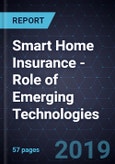New Business Models and Enhanced Customer Engagement Critical for Insurers to Retain Relevance and Competitiveness
Consumers' interest in connected devices has been one of the significant drivers of innovation in the sector. Over the years, as the cost of sensors declined, the number of IoT-enabled devices has increased steadily and they have become more affordable and viable. However, consumers continue to be wary about data privacy and sharing.
The application of data gathered from smart devices can be used across many other verticals, such as auto telematics, healthcare, and banking and financial services. One such application is home insurance - Smart home insurance is an upcoming market. The ecosystem essentially comprises insurers, technology providers, InsurTech companies, and smart device manufacturers. While it is imperative that different stakeholders work together for rapid and meaningful growth of the market, initial estimates of growth have not been met.
Smart devices deployed in homes to monitor or detect risks such as theft, CO, fire, and water leaks, etc. contribute data about consumer usage and preferences that can be effectively used to design home insurance policies that are customized and cost less. Most insurers are using monetary benefits in the form of discounts on premiums and devices or even free devices to entice consumers. This is a common strategy and consumers have expressed readiness to adopt smart home insurance in exchange for free devices or discounts.
This report will outline:
- Challenges faced by consumers and insurers
- Impact of advanced and emerging technologies on smart home insurance
- Drivers and Restraints
- Growth Opportunities
- Market Trends
The report also includes company profiles of some market participants, examples of smart homes insurance implementations and innovations, and recent development such as investments and collaborations in the industry.
The next step however, is to identify the real differentiator and these will be based on how companies interact and engage with their consumers; so rather than just at the time of purchasing a policy and making a claim; engaging with them throughout the duration of the policy with benefits, is an attractive proposition. Value added services are something else that they have come to expect in exchange for data – ranging from alerts about intruders, or leaks to maintenance services.
Data generated by consumers can be used by insurers to further enhance customer engagement, improve processes, and reduce costs. Use of advanced technologies such as artificial intelligence (AI), machine learning (ML), Big Data Analytics (BDA) and emerging technologies such as Blockchain and drones is expected to greatly improve smart home insurance. Some of the challenges faced by insurers include data security, lack of understanding of outcomes, lack of skills, ambiguity in regulations, and the exact understanding of impact of technologies. However, the interest is high and many pilots and initial implementation of technologies are underway.
Key Issues Addressed
- What are the challenges faced by consumers and insurers?
- What are the different technologies impacting the smart home insurance market?
- What are the drivers and restraints in the smart home insurance market?
- What are the top growth opportunities in the smart home insurance market?
- What are some of the innovations and companies making news in the smart home insurance market?








